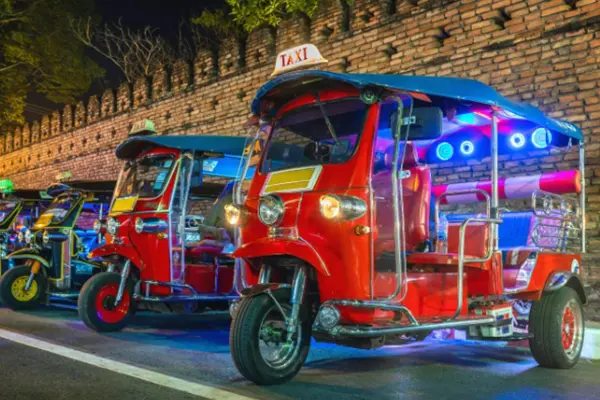The term “tuk tuk” has become synonymous with a unique and vibrant mode of transportation found in many Southeast Asian countries, particularly Thailand. These three-wheeled vehicles are not only a common sight in bustling city streets but also represent a significant aspect of the local culture and economy. In this article, we will delve into the meaning of “tuk tuk” in Thai, its origins, and its cultural significance.
The Meaning of “Tuk Tuk”
In Thai, the word “tuk tuk” refers specifically to a type of motorized rickshaw. The name itself is believed to be an onomatopoeic term derived from the sound made by the vehicle’s two-stroke engine. The “tuk” sound imitates the noise of the engine, while the repetition in the name adds a playful and catchy quality. This distinct naming also reflects the lively atmosphere of Thailand’s streets, where tuk tuks zip through traffic, creating an auditory experience that is part of the urban landscape.
Origins of the Tuk Tuk
The tuk tuk’s origins can be traced back to the 1960s when the first models were introduced in Thailand. Inspired by the Japanese “auto-rickshaw,” these vehicles were designed to offer an affordable and flexible means of transportation for both locals and tourists. Over time, tuk tuks became increasingly popular due to their maneuverability in narrow streets, low operating costs, and the ability to navigate congested traffic.
Initially, tuk tuks were powered by small two-stroke engines, which contributed to their distinctive sound. However, as environmental concerns grew, many tuk tuks have been upgraded to four-stroke engines or electric motors, making them more eco-friendly while retaining their charm.
The Role of Tuk Tuks in Thai Culture
Tuk tuks are more than just a means of transportation; they play an integral role in Thai culture and daily life. Here are some key aspects of their cultural significance:
- A Unique Tourist Experience: For many visitors to Thailand, riding in a tuk tuk is a quintessential experience. It offers a fun and adventurous way to explore cities like Bangkok, Chiang Mai, and Phuket. Tourists often enjoy the open-air design, which provides a unique vantage point for observing the sights and sounds of the bustling streets.
- Symbol of Urban Mobility: Tuk tuks symbolize the informal economy in Thailand, providing livelihoods for many drivers who may not have access to traditional taxi services. These drivers often work independently, offering flexible transportation options for locals and tourists alike. The affordability of tuk tuk rides makes them accessible to a broad range of people.
- Cultural Icon: The colorful designs and intricate decorations of tuk tuks make them a vibrant part of the Thai visual landscape. Many drivers personalize their vehicles with various motifs, reflecting their personality and cultural heritage. This creativity contributes to the overall charm and appeal of tuk tuks as cultural icons.
- Navigating Thai Streets: Tuk tuks are particularly well-suited for navigating Thailand’s crowded urban areas, where traditional taxis might struggle. Their compact size allows them to weave in and out of traffic, making them a practical choice for short trips, especially in congested cities.
Challenges Facing Tuk Tuks
Despite their popularity and cultural significance, tuk tuks face several challenges. Increased competition from ride-hailing apps, concerns about pollution from older models, and regulatory issues are impacting their viability. In response, many tuk tuk drivers are transitioning to electric models, which offer a cleaner alternative while maintaining the iconic essence of this mode of transport.
Additionally, the COVID-19 pandemic significantly affected tourism, leading to a decline in tuk tuk usage as fewer visitors explored Thailand’s cities. Many drivers faced financial hardships during this time, prompting a need for innovative solutions to adapt to changing circumstances.
Conclusion
In summary, “tuk tuk” in Thai refers to a distinctive and beloved mode of transportation that has become a cultural emblem of Thailand. The name, derived from the sound of the vehicle’s engine, encapsulates the essence of this unique three-wheeled rickshaw. Beyond transportation, tuk tuks represent a vibrant aspect of daily life, offering insight into the local economy and culture. Despite facing challenges in a rapidly changing world, tuk tuks continue to charm both locals and tourists, remaining an integral part of the Thai urban experience. Whether you’re haggling with a driver for a fair price or enjoying the breeze as you zip through the streets, a ride in a tuk tuk is a memorable way to experience the heart of Thailand.
Post time: 09-30-2024





